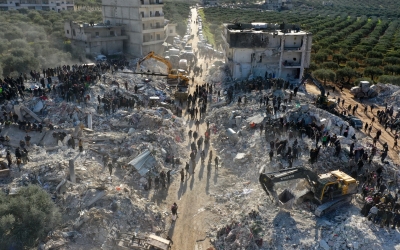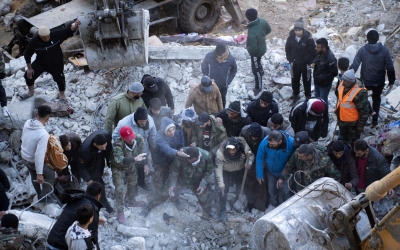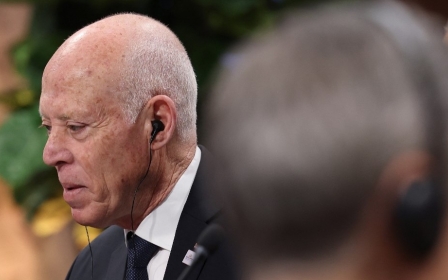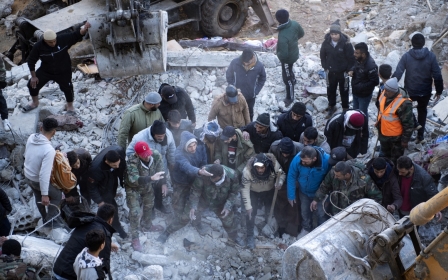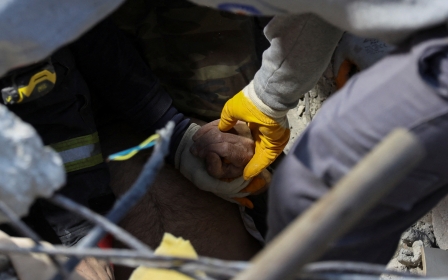Syria earthquake: Why sending aid is complicated
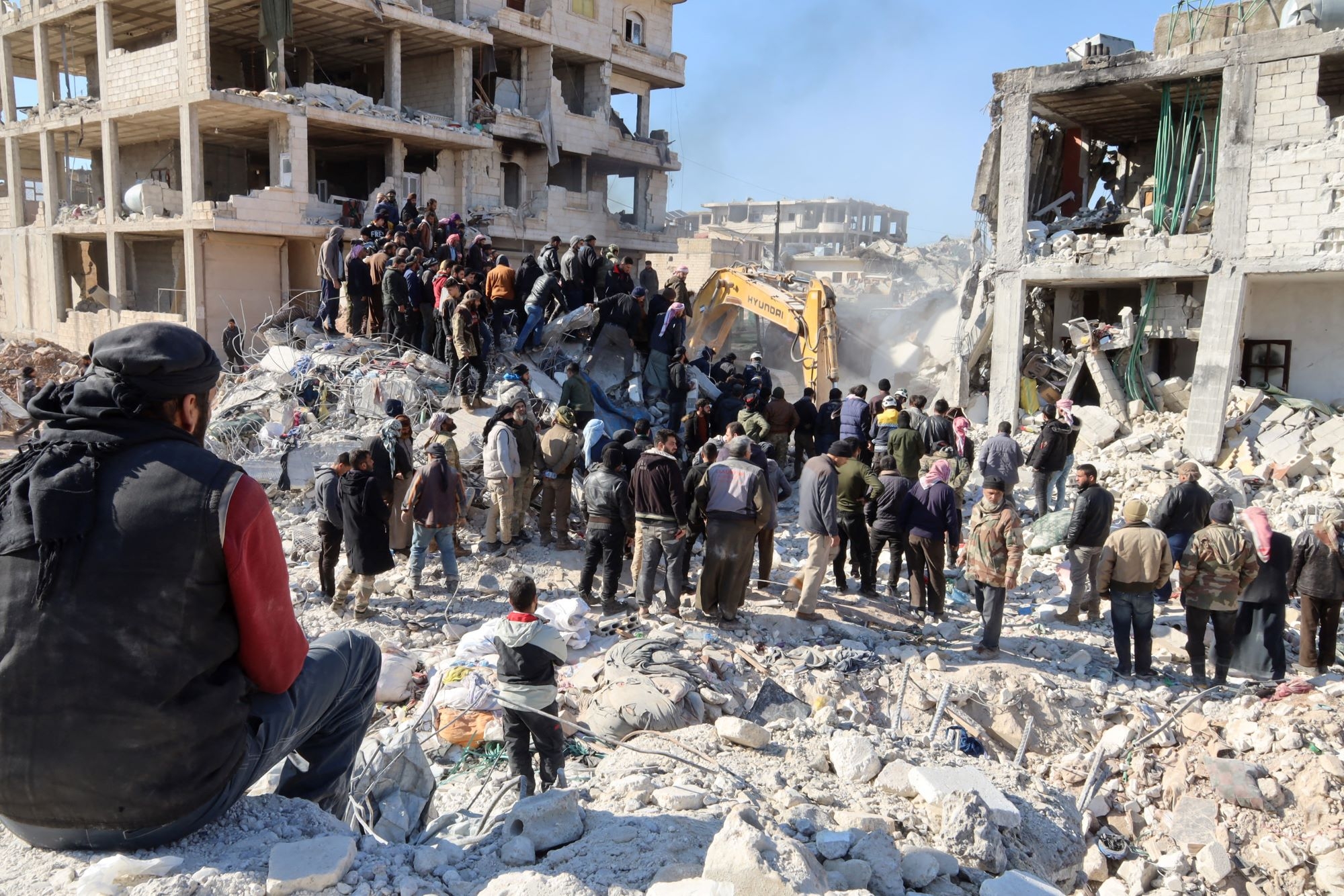
The devastating earthquakes that struck the Middle East on Monday have left devastation across Turkey and Syria, and have generated offers of support and aid from countries across the globe.
But while material support and manpower flow fairly smoothly into Turkey, there are numerous obstacles in getting aid into northern Syria.
The region, largely controlled by rebel groups opposed to the government of President Bashar al-Assad, had already been dependent on aid agencies to a large extent for many years, with its people enduring poverty, homelessness and repeated bombing campaigns by the government and its allies.
The earthquakes have exacerbated an already fragile situation, destroying much of the crumbling housing and infrastructure of the region as well as the routes that already existed for aid convoys.
But the destruction of physical routes into the region is just one of the many issues that have made providing aid to earthquake survivors so difficult.
New MEE newsletter: Jerusalem Dispatch
Sign up to get the latest insights and analysis on Israel-Palestine, alongside Turkey Unpacked and other MEE newsletters
Middle East Eye takes a look at the main problems facing Syrians in the wake of the disaster.
What is the political situation in northern Syria?
Syria has been gripped by civil war since 2011, when Assad's goverment opened fire on demonstrators calling for economic reforms and greater democratic rights in the country.
Since then, there have been hundreds of thousands killed and while at one point the Syrian opposition held much of the country, they now largely only control the northwestern territory of Idlib.
The two primary powers in Idlib are forces backed by the Turkish government and Hay'at Tahrir al-Sham (HTS), a militant group that split from al-Qaeda in 2017.
At present, the only border crossing between Turkey and opposition-held territory is Bab al-Hawa. Four cross-border aid points established by the UN in 2014 have gradually been closed by Damascus and its Russian backer, leaving just Bab al-Hawa.
Many were alarmed when it was shut briefly after Monday's quake, but it reopened on Thursday. The crossing has been described as a "lifeline" by the UN for the four million or so people in Syria's Idlib.
Government-controlled areas have seen aid and material support coming from Damascus' traditional allies and a number of countries whose ties with the government have been warming, including Russia, the UAE, Iran, Algeria and Iraq.
What aid has made it in so far?
On Thursday, the first UN aid deliveries arrived in northwestern Syria. In a statement, the US Agency for International Development said its aid package would go to partners on the ground "to deliver urgently needed aid for millions of people".
The International Organization for Migration (IOM) said in a statement that the delivery includes blankets, mattresses, tents and "basic relief items... to cover the needs of at least 5,000 people".
Four days after the quakes, however, there is little hope of discovering more survivors among the wreckage.
Speaking to press in Geneva on Friday, the UN refugee agency (UNHCR)'s Syria representative Sivanka Dhanapala said 5.35 million had been affected by the quake in the country and were in need of shelter assistance.
"We are focusing very much as UNHCR on shelter and relief items, whether that means, you know, ensuring that collective centres that displaced persons have gone to are adequate in terms of facilities, tents, plastic sheeting," he said.
"And of course, I mentioned earlier the thermal blankets, the sleeping mats, winter clothing and so on."
However, numerous aid workers and organisations have spoken of delays and other difficulties in distributing support.
Officials and humanitarian workers told MEE on Tuesday that delays were in part a result of officers and guards at the crossing having been personally impacted by the earthquake.
Humanitarian aid workers in Turkey told MEE that customs officials who run the Cilvegozu border gate leading to the opposition-held Idlib province through Bab al-Hawa were among those killed or trapped under the rubble in Hatay province.
Turkish border officials who survived were either taking care of relatives or searching for loved ones, the aid workers added.
UNHCR also told MEE that Gaziantep, the epicentre of the earthquake in Turkey, was the hub for the UN and other agencies that coordinated relief efforts into northwest Syria.
It added that some of those offices, and the homes of its staff, had been destroyed or damaged.
"Some of the areas where the earthquake has hit are remote and hard to reach, so the scope of losses in lives and damages is still to unfold," it said.
Are sanctions impeding aid efforts?
There has been much discussion in recent days about whether the sanctions applied against the Assad government, as well as some rebel groups, have been impacting the ability for aid to reach affected areas.
Some aid organisations, including the Damascus-based Syrian Arab Red Crescent, have called for sanctions to be lifted on the Syrian government.
Government ministers have also added their voices, with Syrian Foreign Minister Faisal Mekdad saying on Tuesday that sanctions on Syria had "made the disaster all the worse".
While international aid is nominally exempt from the sanctions, the practical effect of the sanctions and a lack of clarity on what is permissible can delay the aid process.
"Good luck trying to find a bank that will let you wire money to Syria," Aron Lund, a fellow at Century International, told MEE on Thursday.
Syrian opposition figures have long argued, however, that any aid sent through official UN agencies to the country would only end up in the hands of the Assad government, who, as the official representative of Syria to UN, would ultimately decide where the aid is directed.
A report released in October found "systemic" corruption in UN humanitarian aid to Syria, with individuals accused of human rights abuses benefiting from procurement contracts with the international body.
Between 2019 and 2020, nearly 47 percent of UN procurement funding in Syria went to businesses tied to human rights abuses committed by the Assad government, according to a report by the Syrian Legal Development Programme (SLDP) and the Observatory of Political and Economic Networks (Open).
The authors found that Damascus kept 51 cents of every international aid dollar spent in Syria in 2020.
"[Western countries] don't want to give Damascus bilateral aid, not because of sanctions but because they rightfully don't trust Damascus to not massively exploit and deprive other areas," Dareen Khalifa, a senior analyst at the International Crisis Group, told MEE.
What is happening now?
On Friday, the Turkish government announced that it was discussing re-opening a border crossing into Syrian government territory to allow aid to go into government-controlled areas.
The move would be significant after years of frozen relations between the two countries over Turkey's support for the Syrian opposition.
According to an official quoted by Reuters, there are "plans to open [the] Yayladagi - Kasab border gate at first" which would enable crossings between Turkey's Hatay province and Latakia.
"Aid sent from there can directly go to areas under Syrian government control," said the official.
He added that there were also negotiations underway to allow further aid into rebel-held territory.
"Discussions and planning continue to open another gate that would enable sending aid to Idlib and United Nations aid to areas completely flattened by the quake," the official said.
On Friday, the Syrian government said it had approved international aid being delivered to rebel-held areas.
"The Council of Ministers approves... the delivery of humanitarian aid to all parts of the Syrian Arab Republic," said a cabinet statement on Friday.
Damascus said assistance would arrive to those who need it most with the help of the UN, the Syrian Red Crescent and the International Committee of the Red Cross.
Middle East Eye delivers independent and unrivalled coverage and analysis of the Middle East, North Africa and beyond. To learn more about republishing this content and the associated fees, please fill out this form. More about MEE can be found here.


